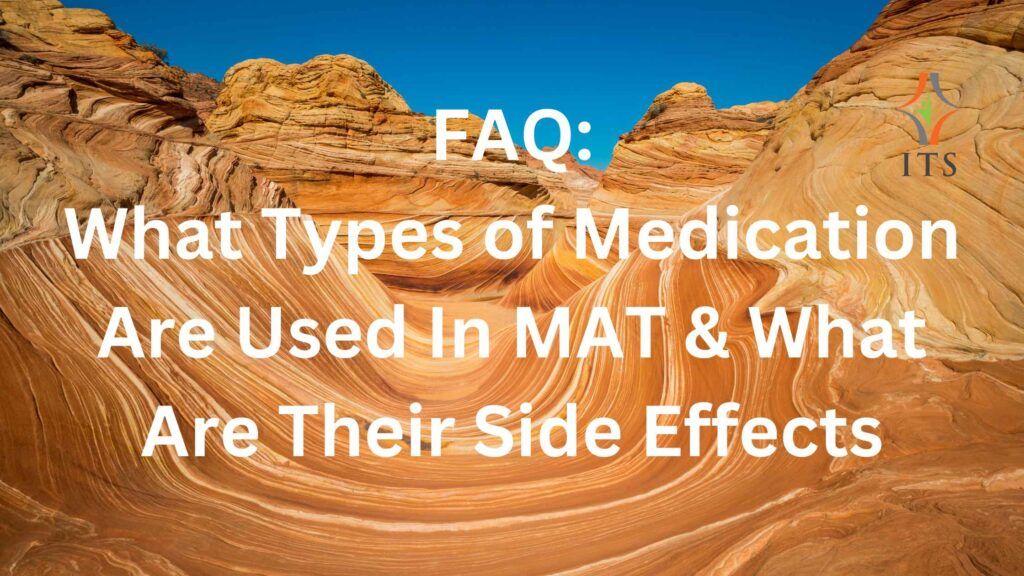How Does It Work In Treating Substance Use Disorders?

Medication-Assisted Treatment (MAT) stands at the forefront of modern strategies in combating Substance Use Disorders (SUDs), particularly those involving opioids. Our approach to MAT is rooted in a professional, informative, compassionate, and authoritative ethos, emphasizing the importance of integrating FDA-approved medications with comprehensive behavioral therapies. Among the medications we utilize are Methadone, Suboxone (a formulation of buprenorphine and naloxone), Vivitrol (Naltrexone), and Naloxone (Narcan) for emergency overdose intervention.
Our commitment to providing a comprehensive and compassionate approach to addiction treatment through Medication-Assisted Treatment (MAT) is underscored by our dedication to transparency and education. Understanding the potential side effects of each MAT medication is crucial for informed decision-making and optimizing treatment outcomes.
What Types Of Medications Are Used In MAT And What Are Their Side Effects?
Here’s how these treatments play a pivotal role in our holistic care model as well as any potential side effects associated with each:
Methadone:
As a long-acting opioid agonist, Methadone mitigates withdrawal symptoms and cravings by acting on the same brain receptors as other opioids but without inducing euphoria. Administered under strict supervision at our facility, Methadone supports patients in stabilizing their lives and engaging fully in their recovery journey. Methadone is an effective medication used in the treatment of opioid use disorder, offering relief from withdrawal symptoms and reducing cravings. However, patients may experience side effects such as nausea, constipation, sweating, drowsiness, and sexual dysfunction. It’s important for individuals to communicate any side effects with their healthcare provider to adjust the treatment plan as necessary.
Suboxone (Buprenorphine/Naloxone):
Suboxone offers a dual-benefit mechanism by reducing opioid cravings through buprenorphine while naloxone guards against misuse. This medication provides a safer, more manageable recovery path that allows patients to maintain their daily responsibilities. Possible side effects include headache, nausea, vomiting, excessive sweating, constipation, insomnia, and mouth numbness or redness. As with any medication, it’s vital to report these side effects to ensure appropriate management and adjustment of the treatment regimen.
Vivitrol (Naltrexone):
As a non-addictive opioid antagonist, Vivitrol blocks the effects of opioids at receptor sites in the brain. Administered monthly via injection, it is particularly effective for individuals committed to abstinence, helping prevent relapse by eliminating the potential for opioid-induced euphoria. Used to prevent relapse in individuals who have detoxified from opioids, side effects can include nausea, headache, dizziness, fatigue, injection site reactions, and muscle cramps. Monitoring and reporting these side effects are essential steps in managing them effectively and ensuring the continued success of the treatment plan.
Naloxone (Narcan):
In our commitment to safeguarding lives, we also emphasize the importance of Naloxone for emergency situations. This life-saving medication can rapidly reverse an opioid overdose, making it an essential component of our comprehensive care strategy, especially in the initial stages of treatment. While its primary role is emergency intervention rather than ongoing treatment, potential side effects include rapid heart rate, body aches, fever, sweating, runny nose, sneezing, and nervousness. These effects typically arise from the abrupt reversal of opioid effects in the body and underscore the importance of medical supervision during its use.
Our approach to MAT is rooted in a holistic understanding of each individual’s needs, including careful consideration of potential side effects. Our dedicated team of healthcare professionals is here to guide patients through their treatment journey, providing support, adjustments to treatment plans, and education to ensure that individuals feel empowered and informed every step of the way.
We encourage anyone with questions or concerns about MAT or its potential side effects to reach out. Our goal is to provide a supportive, informed, and compassionate pathway to recovery, grounded in the best practices and latest research in addiction treatment.
If you or someone you love is struggling with a substance use disorder, we encourage you to reach out. Together, we can determine how Medication-Assisted Treatment can form a critical part of a comprehensive recovery plan. Our dedicated team is here to provide the care, guidance, and support needed to navigate the path to wellness.
